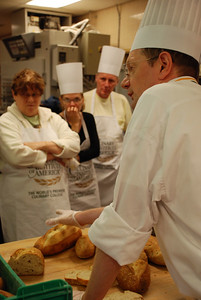Long before I wrote about food, I cooked it. Not in a pull-down-a-weekly-paycheck sense but as in stand-over-a-cutting-board-covered-with-minced-shallots-feeling-remarkably-at-peace-with-the-world way. For years cooking has served as an escape from the trials of everyday life. Consumed by the tribulations of ill family member? Stressed out over a looming deadline? Worried about upcoming exams? Pick up an onion and start chopping.
I am both calmed and rewarded by the strike of the knife blade as it bears down on my wood cutting board, the sizzle of white onions as they carmelize in a hot, olive oil-coated saute pan. Nothing — not yoga, walking, hiking, biking, reading, stroking a beloved pet or “drinking like a mad eejit” — can surpass the tranquility derived from working in a kitchen.
My fondness for cooking is not intuitive. My mother had been a serviceable but unenthusiastic cook. Her standard repertoire included many delightful dishes — beef stroganoff, braciola, chicken cacciatore, French onion soup –none of which she relished making or eating. To her, cooking was a chore, an onus taken on at marriage and borne until death.
Her lack of culinary ardor extended to my education. When asked to teach me how to poach an egg or bake a chicken, she invariably responded with this memorable mantra, “Once you learn how to do it, you’ll always be stuck in the kitchen. Best you don’t learn how to cook.”
While she abhored home cooking, both she and my father adored eating out. Savvy diners, they approached restaurant food with a critic’s eye. Waiters were beckoned. Entrees were praised or criticized. I spent countless evenings wishing that I could slide beneath the linen-draped table as my mother sent her charred filet mignon back to the kitchen or my father requested a fresh veg to replace his limpid green beans. Embarrassment aside, I learned much about what constitutes passable versus gourmet cuisine.
About 10 years ago I developed a serious interest in cooking. The impetus, in part, was yet another cancer diagnosis in my family. The disease’s prevalence made me consider not only genetics but also the environment and what we had been putting into our bodies. Out went the prepared foods, the canned soups, frozen dinners and taco kits. In came organic produce, fresh herbs, free-range chickens and healthful cookbooks. I poured over such weighty tomes as “The Joy of Cooking,” Nigella Lawson’s “How to Eat” and Deborah Madison’s “Vegetarian Cooking for Everyone” and religiously followed their recipes.
The more time I spent in the kitchen, the more I realized how pleasurable and gratifying cooking could be. With some guidance and a bit of confidence, I might just rise above family history.
Enter the Culinary Institute of America in Hyde Park, New York. Deemed the United States’ preeminent culinary school, the CIA offers day-long “food enthusiast” classes throughout the year. These hands-on courses cater to non-professionals and cover such useful topics as knife skills, making sauces and baking breads.
One look at my Band Aid-covered fingers told me exactly which course to take. Knife skills would be my first class at the CIA. In it I learned how to break down a whole chicken, debone a fish, slice salmon and trim rib meat. I also discovered how to mince vegetables quickly and efficiently. Most importantly, I found out how to hold my 10″ chef’s knife so that I wouldn’t slice my fingers and unintentionally add a splash of color to my dinners.
The 6-hour session transformed me from a blood-letting menace to a slicing and dicing machine. It also gave me an unshakable addiction to the adult education program at the CIA. The next course that I would take, Country French Suppers, only fed my fixation.

Potato Leek Soup
Serves 4 to 6
Based upon a recipe from Lynne Gigliotti’s Country French Suppers class at the CIA.
Ingredients:
6 ounces leeks, cleaned and diced
2 tablespoons butter
1 pound Idaho or Yukon gold potatoes, peeled and diced
4 cups chicken stock
splash of heavy cream
salt and pepper to taste
Melt butter in small stockpot. Add leeks and sweat until transparent.
Add potatoes and cook for 5 more minutes.
Add chicken stock and bring to boil. Skim then reduce heat and simmer for about 30 minutes or until potatoes are tender.
Season with salt and pepper then pour into blender and puree.
Return to stockpot. Check seasoning and add splash of cream. Stir then serve.